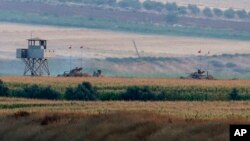The U.S. government revealed earlier this month that its plan to train and equip thousands of “moderate rebels” to fight the Islamic State in Syria has not materialized. But with Turkey joining the fight and Syria's government advancing on ISIS-controlled areas, officials say they hope more localized efforts will yield better results.
For about a year, President Barack Obama called for the arming and training of ground troops in Iraq and Syria to fight the self-proclaimed Islamic State, also known as ISIS, or ISIL, or the Arabic term Daesh.
But U.S. Secretary of Defense Ash Carter said earlier this month that the plan to train and arm these “moderate rebels” to fight ISIS in Syria is going slowly, with only 60 men in training as opposed to the thousands they had planned to train this year.
On Thursday, Carter said in Iraq that “we will defeat Daesh [Islamic State] because civilization always wins over barbarity. But to defeat Daesh, we need capable ground forces that we can enable and support and we will. And getting those forces in turn requires inclusive governance.”
Critics say the plan in Syria was never going to work. Sarah Leah Whitson, executive director of Human Rights Watch's Middle East and North Africa division, said It is "not clear that a real moderate Syrian opposition any longer exists."
"The moment to have supported moderates calling for democratic change in Syria was probably before they took up arms against the government,” she added.
Essentially, she said, the U.S. wants to support opposition rebels to fight the Islamic State group, while ignoring the civil war that makes the men “rebels” in the first place.
Syrian Foreign Minister Walid Muallem said other U.S.- led coalition efforts have done nothing to stop ISIS from gaining ground in Syria.
He said a new regional alliance is needed to successfully fight terrorism in Syria, and noted that the Syrian army is also on the offensive.
One Syrian officer, on the outskirts of Palmyra, said government forces plan to take back the ancient city and the surrounding area.
From across the border, for the first time, Turkish war planes began attacking Islamic State targets in Syria; and authorities recently began arresting suspected supporters in Turkey.
Some analysts said regional efforts may be more successful than Western efforts because nearby countries have a greater stake not just in the battle with ISIS, but in civil war itself.
Whitson said peace talks that exclude extremist groups are the only way to end the civil war. But as ISIS grows, the prospects of talks succeeding may dim.
“Whether or not that’s practically feasible on the ground given the power, the military power that the extremist armed groups have now in Syria is hard to say,” she said.
Other analysts added that regional involvement has also deepened the war in Syria allowing ISIS to flourish, as foreign countries and groups fight proxy wars on Syrian battlefields.
There is no one best way to fight the Islamic State in Syria, they added; and the civil war will produce no winners.





